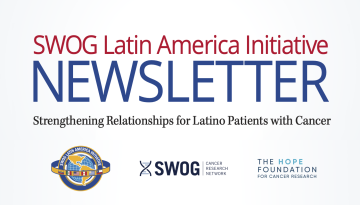A Trial’s Primary Results Are Just the Start
We try to honor the contributions of the volunteers who enroll to our studies by ensuring we learn as much as we can from those trials. That includes analyzing banked biospecimens and our ever-growing library of associated clinical data. Typically, a trial's primary results are just the start.
The S1314 COXEN trial is a good example. Led by Dr. Thomas Flaig, S1314 tested whether a new type of biomarker based on gene expression (COXEN = coexpression extrapolation) could be used to help identify which patients with localized muscle-invasive urothelial bladder cancer would respond to neoadjuvant chemotherapy.
Primary results from this study were published in Clinical Cancer Research in 2021, with longer-term survival results presented at ASCO’s Genitourinary Cancers Symposium in 2022.
Those primary results were mixed, but they were far from the end of the story. Subsequent analyses continue to produce valuable insights into other routes for identifying which patients in this disease setting are most likely to benefit from chemotherapy, and which may be able to forego surgery.
Work presented at the 2022 ASCO annual meeting analyzed methylation patterns in cell-free DNA extracted from blood samples from S1314 patients to predict chemotherapy response, suggesting a potential liquid biopsy route to these answers.
Another analysis of S1314 samples, published last fall, found that considering the tumor’s molecular subtype based on differences in RNA expression could enhance the predictive ability of other biomarkers, such as the COXEN score, to predict response to chemotherapy. This subtyping approach may be incorporated into some of our future trials in this disease setting.
The latest important secondary analysis to come from S1314 was just published in the journal European Urology (read our press release to learn more).
Lead author Dr. Elizabeth Plimack and her team analyzed banked pre-treatment tumor specimens from 105 patients enrolled to S1314, looking for mutations in specific genes known to be involved in DNA damage repair.
They found that patients whose tumors had a mutation in any one of three of these genes were more than five times as likely, compared to patients whose tumors lacked such mutations, to be cancer free at the time of surgery, indicating their tumors had had a complete pathologic response to their neoadjuvant chemotherapy.
The larger goal in this work is bladder preservation – to be able to use biomarker tests of this sort to predict which patients have tumors that are highly likely to be cleared by cisplatin-based neoadjuvant chemotherapy so that those patients, if other clinical evidence concurs, can be recommended for continued surveillance and monitoring rather than surgery. Other studies such as the RETAIN trial are now underway to gather prospective data to help answer these questions.
I’ve often heard one or another of SWOG’s clinical trials described as a “gift that keeps on giving.” Let’s face it – we design our trials, S1314 included, to ensure they supply useful data for years (or decades, in some cases) to come. This is one of the reasons our biobank now holds more than 1.4 million biospecimens.
These specimens and their associated clinical data are also gifts – from patients who enrolled to our trials. Our commitment to learning all we can from these helps ensure that these gifts keep on giving to future patients.
Other Recent Stories



